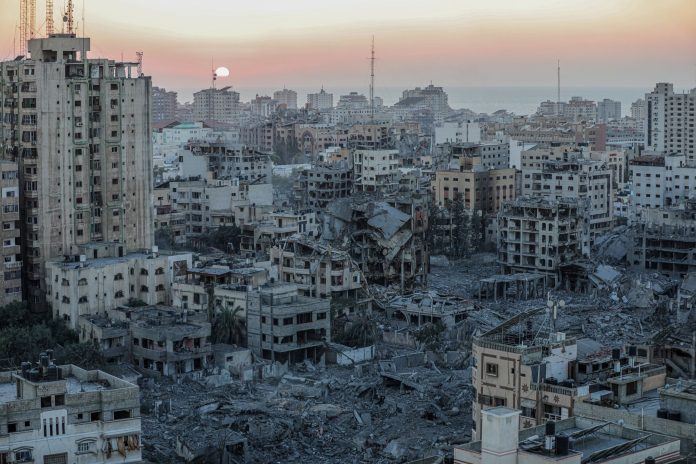——- The case stems from a 2022 request from the UN General Assembly, predating the current Israel-Hamas conflict
DM Monitoring
HAGUE: The United Nations’ highest court said that Israeli settlements in occupied Palestinian territories are illegal under international law, in an advisory opinion issued on Friday.
The findings by judges at the International Court of Justice (ICJ), known as the World Court, are not binding but carry weight under international law.
“Israeli settlements in the West Bank and East Jerusalem, and the regime associated with them, have been established and are being maintained in violation of international law,” President Nawaf Salam said, reading the findings of a 15-judge panel.
The case stems from a 2022 request from the UN General Assembly, predating the current Israel-Hamas conflict.
The UN Assembly asked the court to appraise the legal consequences of Israel’s “prolonged occupation, settlement and annexation” of Palestinian territories, including East Jerusalem, and associated Israeli government policies.
Earlier, Last month, the International Court of Justice, the United Nations’ highest court, issued an interim ruling, instructing Israel to take all necessary measures to prevent acts of genocide in Gaza. However, the World Court stopped short of demanding a halt to the military offensive against Palestinians in the enclave.
In its landmark 84-page case at the International Court of Justice (ICJ), South Africa characterized Israel’s actions in Gaza as genocide. In response, Israel rejected the allegation, claiming its ongoing military campaign in Gaza is self-defense, necessary to eliminate Hamas, and stating firmly that the conflict cannot stop without achieving this goal.
South Africa formally requested the ICJ to issue an immediate cessation of hostilities order to Israel, alleging a violation of the 1948 Convention on the Prevention and Punishment of the Crime of Genocide. This convention, established after World War II and the Holocaust, defines genocide as acts such as killings committed with the intent to destroy, in whole or in part, a national, ethnic, racial, or religious group.
Delivering the 45-minute judgment at the court in The Hague, presiding judge Joan Donoghue, a for-mer US State Department official, rejected Israel’s primary claim that the court lacks jurisdiction to hear South Africa’s case.
Subsequently, in its ruling, the court ordered Israel to immediately imple-ment measures to limit harm to Palestinians in Gaza, instructing it to:
● Prevent acts prohibited in the 1948 UN genocide convention, including killing Palestinians, causing them serious bodily or mental harm, and deliberately inflicting conditions of life calculated to bring about their physical destruction in whole or in part.
● Prevent and punish statements constituting incitement to genocide against Palestinians in Gaza.
● Ensure the provision of basic services and humanitarian aid to address adverse conditions of life in Gaza.
● Preserve evidence related to allegations of genocidal acts.
● Report back to the court within one month on its compliance with the orders.
Imbued with historical significance, the ruling by the World Court is seen as a legal and moral victory for the Palestinians. However, analysts contend that, despite the binding nature of the order, the ab-sence of enforcement mechanisms will eventually hinder its effectiveness in safeguarding the people of Gaza from the genocidal war machine.
According to ReliefWeb, a humanitarian information service by the United Nations Office for the Coor-dination of Humanitarian Affairs (OCHA), intense Israeli bombardment from air, land, and sea contin-ued across much of the Gaza Strip on 28 and 29 January after the World Court’s ruling, leading to addi-tional casualties, displacement, and destruction.
So far, more than 27,000 people have been killed and 66,000 injured in the ongoing Israeli military of-fensive against Hamas. Gaza’s Health Ministry reports that most of those killed are women and chil-dren.
Reports by the United Nations Relief and Works Agency (UNRWA), the main lifeline for millions of Pal-estinian refugees in Gaza, the West Bank, Jordan, Lebanon, and Syria, state that an estimated 1.7 mil-lion internally displaced persons (IDPs) exist in the war-torn territory. The agency notes that most of them have been displaced multiple times as families have been forced to move repeatedly in search of safety. Since the October 7th attack by Hamas that resulted in a massive military operation by Israel, Gaza’s healthcare, according to WHO reports, remains fragile. The seven partially functional hospitals are only providing limited maternity, trauma, and emergency care services due to the severe shortage of supplies and healthcare workers.
While the conflict in the Middle East persists without any apparent slowdown, experts provide mixed responses to the recent ruling by the United Nations’ top judicial body. To analyze the January 26 court decision and the escalating hostilities in the region, the Express Tribune reached out to Dr. Gregory H. Stanton, the founder of Genocide Watch, a nonprofit group that raised warnings ahead of the massa-cres in Rwanda in the 1990s.
In a no-holds-barred interview, Dr. Stanton, also a former professor in genocide studies and preven-tion at George Mason University, underscores the likelihood of major war crimes and crimes against humanity occurring on both sides of the conflict. He believes that last month’s ICJ ruling carries signifi-cant weight, indicating a growing international commitment to enforcing laws against genocide. How-ever, he cautions that if the goal is to prevent war crimes, efforts must be intensified to bring an end to the ongoing conflict, which currently shows no signs of resolution.




